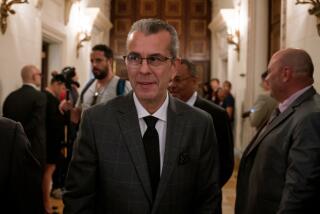Marcos Failing to Ensure a Fair Vote, Lugar Says; U.S. Experts to Assess Situation
- Share via
WASHINGTON — Philippine President Ferdinand E. Marcos has failed to take several actions needed to ensure that next month’s presidential election will be fair, the chairman of the Senate Foreign Relations Committee warned Friday.
Sen. Richard G. Lugar (R-Ind.) told reporters that unless Marcos acts quickly to get the armed forces out of politics, give opposition candidates access to the media and allow independent poll watchers to monitor the Feb. 7 vote, Congress will not accept the results as legitimate.
At the same time, Lugar also said he is skeptical about the Reagan Administration’s chances of winning congressional approval for military aid to the rebels fighting Nicaragua’s leftist regime.
“I would like to see these contra leaders in the halls of Congress so we can find out what sort of horse we are riding on if we decide on military assistance,” he said, using the Spanish term for the rebels.
Asian, Latin Crises
In a news conference that touched on foreign policy issues worldwide, Lugar said his committee is paying close attention to the crises in the Philippines and Nicaragua and also plans hearings on the Middle East and U.S.-Soviet relations.
He announced that he is sending a delegation of election experts from both Democratic and Republican Party organizations to evaluate the Marcos regime’s preparations for the Philippine election--and, aides added, to pressure Marcos toward making reforms demanded by the United States.
Marcos is running for reelection against Corazon Aquino, the widow of opposition leader Benigno S. Aquino Jr., who was assassinated in 1983.
Administration officials have said they fear that Marcos, who has held power for 20 years, may use his control over local government officials and the national election commission to fix the results.
Along with congressional leaders, the Administration has called on Marcos to take a series of steps to make the vote fair.
Asked about Marcos’ attitude toward the election, Lugar was politely skeptical. “I have no way to characterize President Marcos’ judgment about this,” the conservative Republican said. “I suspect he’s taking the election seriously from the standpoint of a candidate who wants to win. In terms of the reforms, I don’t know.”
Some Hopeful Signs
Lugar said there have been some hopeful signs, including the official designation of Aquino’s ticket as the “dominant opposition party,” which in theory should guarantee access to radio and television time and the accreditation of an independent citizens’ group as official election observers.
But he said that those steps are not sufficient to make the election fair and that there are still several areas where reform is needed.
“I think the status of the military is completely one of conjecture,” Lugar said. “This is a big factor.” Marcos’ critics have charged that the armed forces might intimidate opposition organizers and voters in some areas.
“Media space has not been available to the opposition at all,” Lugar complained, adding that television and radio stations reportedly had refused to sell time for opposition commercials.
He said that Congress wants to send an official delegation of observers to the election, but added that observers will not go unless a fair vote is guaranteed.
Problems on Contras
On Nicaragua, Lugar said he expects the Administration to ask for military aid to the rebels. Congress voted last year to provide the contras with $27 million in non-military aid.
But he indicated that the presence in the contra leadership of former supporters of Nicaragua’s deposed dictator Anastasio Somoza, as well as the contras’ lack of a clear political program, pose problems for Congress.
“It strikes me as important that the leadership of the contras be specifically identified,” he said. “I’d like to know what their program is. . .whether they want a government in exile, whether they believe in constitutional principles.
“Before we have another round of this, I’m trying to think how I’m going to get 51 votes in the Senate,” he said.
Lugar said he expects Congress to consider a proposed sale of weapons to Jordan again this year, after deferring it last year. But, he added, “the momentum of the peace process has declined (in the Middle East). The Jordan arms sale was part of that process. If momentum is seeping out of the peace process, it’s probably seeping out of the arms sale also.”
He said he saw “no indication” that Secretary of State George P. Shultz plans to resign, despite calls from some archconservatives for his replacement.
And he observed that the Gramm-Rudman balanced-budget measure “could have a very substantial effect on foreign policy. Foreign aid and embassy security would be subject to an open negotiation. It appears that the entire government is going to scale down in this country to some extent, and foreign aid will, too.”
More to Read
Sign up for Essential California
The most important California stories and recommendations in your inbox every morning.
You may occasionally receive promotional content from the Los Angeles Times.














